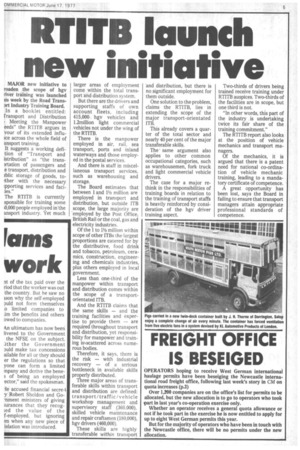RTITB launch new initiative
Page 7

If you've noticed an error in this article please click here to report it so we can fix it.
. MAJOR new initiative to roaden the scope of hgv river training was launched us week by the Road Transoft Industry Training Board. In a booklet entitled: fransport and Distribution Meeting the Manpower eeds" the RTITB argues in your of its extended influice across the whole field of ansport training.
It suggests a working defition of "Transport and istribution" as "the transwtation of passengers and e transport, distribution and iblic storage of goods, to!ther with the necessary ipporting services and faciies."
The RTITB is currently sponsible for training some 0,000 people employed in'the ansport industry. Yet much larger areas of employment come within the total transport and distribution system. But there are the drivers and supporting staffs of own account fleets, including 415,000.. hgv vehicles and 1.2million light commercial .vehicles not under the wing of the RTITB.
There is the manpower employed in air, rail, sea transport, ports and inland waterways and those employed in the postal services.
And there is staff in miscellaneous transport services, such as warehousing and storage.
The Board estimates that between 1 and 11/2 million are employed in transport and distribution, but outside ITB scope, the large majority are employed by the Post Office, British Rail or the coal, gas and electricity industries.
Of the 1 to 11/2 million within scope of other ITBs the largest proportions are catered for by the distributive, food drink and tobacco, petroleum, ceramics, construction, engineering and chemicals industries, plus others employed in local government.
Less than one-third of the manpower within transport and distribution comes within the scope of a transportorientated ITB.
And the RTITB claims that the same skills — and the training facilities and expertise to provide them — are required throughout transport and distribution, yet responsibility for manpower and training is■scattered across numerous bodies.
Therefore, it says, there is the risk — with industrial recovery — of a serious bottleneck in available skills properly distributed.
Three major areas of transferable skills within transport and distribution are defined: transport/traffic/vehicle workshop management and supervisory staff (360.000), skilled vehicle maintenance and repair craftsmen (180,000), hgv drivers (460,000).
These skills are highly • transferable within transport and distribution, but there is no significant employment for them outside.
One solution to the-problem, claims the RTITB, lies in extending the scope of the major transport-orientated ITB.
This already covers a quarter of the total sector and nearly 40 per cent of the major transferable skills.
The ' same argument also applies to other common occupational categories, such as warehousemen, fork truck and light commercial vehicle drivers.
The case for a major rethink in the responsibilities of training boards in relation to the training of transport staffs is heavily reinforced by consideration of the hgv driver training aspect. Two-thirds of drivers being trained receive training under RTITB auspices. Two-thirds of the facilities are in scope, but one third is not.
"In other words, this part of the industry is undertaking twice its fair share of the training commitment."
The RTITB report also looks at the position of vehicle mechanics and transport managers.
Of the mechanics, it is argued that there is a patent need for national co-ordination of vehicle mechanic training, leading to a mandatory certificate of competence.
A great opportunity has been lost, says the Board in failing to ensure that transport managers attain appropriate professional standards of competence.












































































































































































